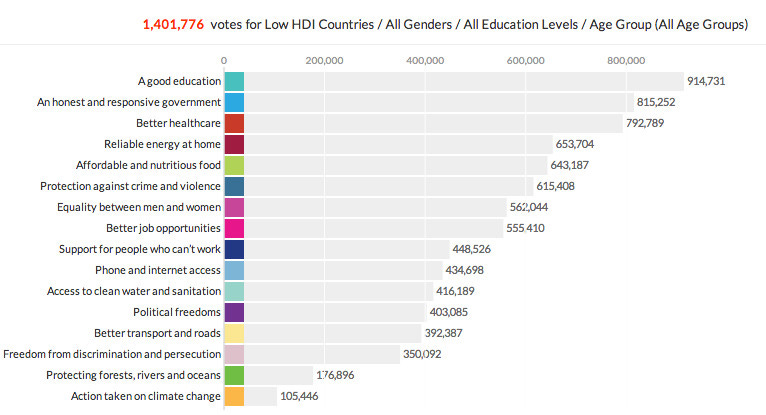🔋The Wealth Of Nations
Climate change is the ultimate first world problem.
If you enjoy, please leave a like! :)

“It is not from the benevolence of the butcher, the brewer, or the baker that we expect our dinner, but from their regard to their own self-interest.” - Adam Smith
We hear a lot about climate change as an existential threat. If you google what are the biggest risks to the world you often get articles related to climate change and rising temperatures. In Marshmallow Size Elephant In The Room, I discuss how personality differences predict whether someone is concerned about climate change. In that piece, I predicted that conscientiousness would be the best personality indicator as it tends to be higher with people concerned about the future. It turns out it was predictive, but was not even in the top two best personality indicators. Climate change, sustainability, and energy debate is so divided these days, so what other factors are important drivers for peoples attitudes?
In 2014, the UN did a worldwide survey about what people were most concerned with and differentiated it based on country. They separated countries based on human development index (HDI) and found that countries higher on the index (wealthier countries basically) were more concerned with “action taken on climate change” than poorer countries. It is also said that climate change issues will affect poorer countries worse due to geography and less ability to mitigate/safeguard the problems. From this standpoint alone it is surprising that poorer countries care less.

There are clearly other factors at play. One is that in more developed nations we hear a lot more in the news about climate change, there’s more push for climate change activism, in general it is seen as virtuous, and ESG1 investment has a grip on many large capital allocators. Furthermore and more importantly, Maslow’s hierarchy of needs is an important psychological concept that should not be overlooked, but often is in the wealthier nations. The theory states that people start at the bottom of the pyramid and once each section is fulfilled they are able to move to higher tiers. Therefore someone is unlikely to be searching for prestige or accomplishment if they are starving.

Where should climate change go on the hierarchy? Some would argue that it should be the bottom as it will affect things like food, water, shelter, and safety of people if the climate gets worse. Others would argue that it is at the top and is merely a thought experiment which doesn’t have immediate threatening consequences. The UN survey suggest that it is indeed higher on the list rather than lower. Poorer countries prioritize just about everything over climate change. The most important things all having to do with health, safety, and job opportunities. Even wealthier countries fulfill the lower tiers of Maslow’s hierarchy before climate change.
People in developing nations are even more worried about fulfilling the lower rungs of the hierarchy than developed nations because they are often actively seeking them each day. In the US we take access to food, water, shelter, safety, education, healthcare, internet access, and cheap energy all for granted compared to the rest of the world. Our first world problems are at the top of the pyramid above. Climate change is a first world problem stemming from us in the developed world not dealing with the lower strata of Maslow’s pyramid on a daily basis.
To put it in more perspective, ~6 million people have died from covid over the last two years. Meanwhile, around 2.6 billion people cook using polluting open fires or simple stoves fueled by kerosene, biomass (wood, animal dung and crop waste) and coal. Of this, ~4 million people die each year from household air pollution stemming from cooking with these fuel sources. We hear that covid is a huge issue, but this is worse on a per year basis and is hardly talked about. Historically, nation with a low HDI rose to higher HDIs through burning fossil fuels. GDP, population, temperature, and CO2 all correlate with an increase in fossil fuel use. In the US, we burn primarily petroleum and natural gas which is much cleaner than the aforementioned fire/biomass/wood. These sources of energy are very dense, cheap, reliable, and healthier than what is being used by billions in low HDI nations worldwide.

There is a push for these developing nations to skip fossil fuels and go straight for renewables for example. This is likely not feasible or ethical at the current time for several reasons. Based on the UN survey, how to get people wanting to take action on climate change is to get the HDI higher for these nations. Nations can provide better access to food, water, shelter, heating/cooling, jobs, and safety if they have more energy. Cheap fossil fuels are the most practical way to do that right now. It would save millions of lives each year through air pollution and give them more energy to use toward other things. Even with the lowering cost of renewables on the long time horizon, places with higher adoption of renewables have higher energy costs. Commodities including PV silicon, batteries, and metals are seeing major price increases around the board and will likely stick around for a while which will make it extremely difficult for already poorer nations to try and adopt more expensive renewables over more energy dense fossil fuels.
It makes sense for poorer nations to use fossil fuels as a stepping-stone to become wealthier and fulfill the lower strata of Maslow’s hierarchy before moving to the next step and taking action on the climate. It is also unfair to expect these poor nations to burden themselves with the task while wealthier nations have reaped the benefits of cheap fossil fuels for years with little thought. Some people want zero fossil fuels burned ever again. That is unserious and would result in the death of millions of people as the worlds energy and thus food depends on fossil fuels today. This is the moral case for fossil fuels in a nutshell.


The best way to get people concerned about the climate is to increase their standard of living and the only successful way to do that thus far is through fossil fuels. If the developing world can stop worrying about the bottom of Maslow’s hierarchy, we can innovate solutions, potentially switch to more nuclear/renewables, and figure out the best path forward in terms of climate and sustainability with the increase in wealth. All with the ability potential to save millions of lives per year and increase quality of life of billions of people in the process.
-Grayson
Leave a like and let me know what you think!
If you haven’t already, follow me at twitter @graysonhoteling and check out my latest thread.

Let someone know about Better Batteries and spread the word!
Socials
Twitter - @graysonhoteling
LinkedIn - Grayson Hoteling
Email - betterbatteries.substack@gmail.com
Archive - https://betterbatteries.substack.com
Subscribe to Better Batteries
Please like and comment to let me know what you think. Join me by signing up below.
ESG=Environmental, sustainability, and governance: companies are often given an ESG score, and many funds will only invest in predetermined ESG friendly companies.



